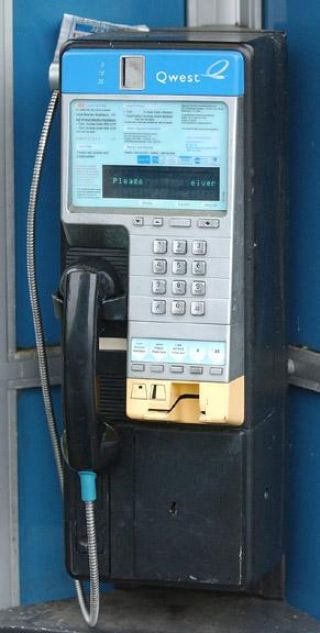By Cody Ellerd
Mercer Island Reporter
They’re the sleeping dinosaurs that we realize we’re glad are not extinct when we find ourselves in the dark ages.
Pay phones may be a thing of the past, but when power gets cut, cell phone circuits get overwhelmed and Internet access is gone, as in last week’s storm, the declining relics may be one of the only lines to the outside world.
Still, there is no guarantee, especially on the Island, that we can count on their continued presence.
“Mercer Island is a very affluent community where we don’t have a lot of phones left,” said Jim Brandt, Director of Infrastructure for FSH Communications, the primary operator of pay phones on Mercer Island. The Chicago-based company owns a total of 20 phones on the Island, down from the 38 it had in service here in 2003.
In Seattle, where there are more homeless people, transients and low-income residents who do not own cell phones or even home phones, FSH operates more than 1,300 pay phones, despite a heavy decline, down from nearly 2,700 in 2003.
“Convenient stores continue to produce very positive revenue, some city sidewalks, especially in larger metropolitan areas, and city parking lots still tend to be pretty lucrative areas,” said Brandt, who works out of Kenmore.
Islanders won’t see the name FSH on any public pay phone. That’s because the privately-held company was created to purchase the assets of Qwest Communications’ Public Access Solutions when it dissolved that division in 2004, and the phones handed over retained the Qwest name.
“We want to make this transition as easy as possible for customers,” said FSH chief Donald Goens in a joint statement the two companies released at the time of the sale. The statement also said that Qwest dropped out of the business because pay phone operations were “no longer part of the company’s long-term business plan.”
FSH has removed pay phones on the Island that don’t make a profit or break even on the $20-$25 per month line charge. That reduction, Brandt said, came at schools (primarily the high school) and miscellaneous businesses where phones weren’t making enough money to cover their line, coin collection and maintenance costs.
“In affluent neighborhoods where nearly everyone has residential service, young kids have cell phones and there are very few street people, pay phones are far less likely to be found,” Brandt said.
The phones FSH continues to operate can be found at both the Island’s QFC stores, Walgreens, Rite-Aid, Longs Drugs and the Park & Ride station. Other pay phones on the Island bear the names of AT&T and Texas-based Com-Tech Systems, though AT&T claims not to operate any pay phones on Mercer Island and Com-Tech could not be reached for comment.
Not surprisingly, pay phone profits spike during months when natural disasters or other emergencies occure. When cell phone circuits get clogged and the electricity gets cut off from the cordless home telephones that many people use, coin operated pay phones are often the only lines still working.
“They’re an important public resource,” said Brooks Harlow, a communications attorney with Miller Nash law firm in Seattle. Often-ignored pay phones suddenly had long lines of people waiting to make calls during the 2003 summer blackout in New York and the Sept. 11 terrorist attacks. “And as we saw last week on Mercer Island, pay phones remain a critical part of our national communications infrastructure,” Harlow said.
But since profitability is the name of the game, it would not be in the interest of FSH or any other company to keep a pay phone operational “just in case,” to provide a means of communication in the event of an emergency such as last week’s storm. Businesses have the option of maintaining a public phone on their premises if they agree to cover the costs. Otherwise, the phone company leases the small square of space it occupies and gives the property owner a percentage of the phone’s profit.
The city of Mercer Island does not maintain any pay phones for residents in case of emergency. “It is considered a resource, but I think we’re kind of in a day and age that we have all these other options available,” said Rebecca Clark, the City’s emergency preparedness coordinator.
Clark said UHF, VHF and ham radios are heavily relied upon for emergency communications. During the storm, the city had radio operators stationed at the shelter it set up at West Mercer Elementary School and at the Emergency Operations Center at City Hall. But Clark admitted that the city’s hand-held radios and the like are of no direct use to the general public.
Joy Bueling, Communications Director for the City of Mercer Island, said that they also depend on neighborhood networks throughout the Island with trained captains in nine different zones who relay important information from residents in need of help. The city distributed 8,000 flyers with emergency information throughout the Island, and free phones that connect directly to emergency dispatch operators are active at both of the Island’s fire stations. At City Hall and the Community Center, free land lines were available to residents during the storm.
Bueling stressed that the city’s emergency preparedness plan is dependent on citizens taking responsibility to organize. Neighborhood networks are an important means of communication. And, for as long as they’re around, it’s good to know where the nearest dinosaur is sleeping — and don’t forget to bring the fifty cents that will wake him up.


